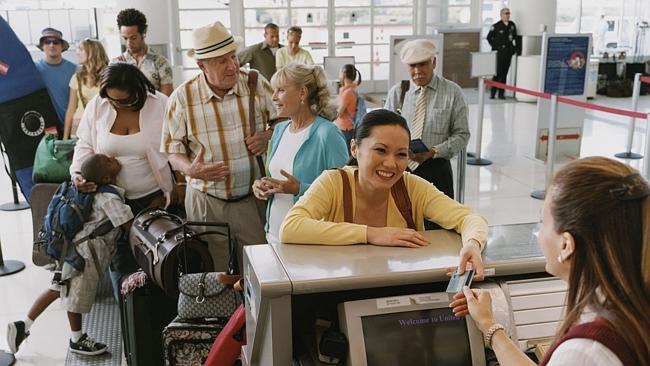Flyers to do more with an increase in self-service systems
AUSTRALIAN travellers should get used to seeing fewer airline staff in traditional service roles as carriers move towards a more flexible model that sees employees as problem-solvers rather than process drivers, one of Australia’s top airline executives says.

Travel
Don't miss out on the headlines from Travel. Followed categories will be added to My News.
AUSTRALIAN travellers should get used to seeing fewer airline staff in traditional service roles as carriers move towards a more flexible model that sees employees as problem-solvers rather than process drivers, one of Australia’s top airline executives says.
Virgin Australia chief customer officer Mark Hassell said increasing automation of the check-in process was one example of the way in which technology is allowing airlines to reduce the number of employees needed to perform traditional airport services, freeing them up to perform other roles.
It comes as unions representing check-in staff at Australia’s busiest airports have warned that travellers could be left to check themselves in on the back of the slashing of frontline jobs at airlines such as Qantas as they strive to rein in spiralling costs.
The Australian Services Union said last month up to 90 full-time check-in staff faced the chop at Sydney Airport and would be replaced by only 30 part-time staff, and that a move towards self check-in could be repeated across the country.
While not commenting directly on the ASU’s concerns, Hassell said reducing the overall number of staff performing traditional “frontline” roles also offered airlines the opportunity to better use them in other positions.
He said this was freeing up carriers to put staff into new customer service roles as problem solvers to better respond to customer’s individual concerns.
“We’re very much using technology to do the heavy lifting process and people to represent the brand,” he said.
Australian Business Traveller editor David Flynn said improving the “customer experience” of travellers was the current buzzword within the airline industry.
He said moving to an increasing self-service model in areas such as check-in and diverting staff to roving customer service roles was one way this could be achieved.
“Anything that focuses on customer experience is good,” Flynn said.
He said frequent travellers were already familiar with self-service check-in and would welcome the trade-off if there were more people made available to deal with individual problems or requests.
“I think moving to a self service system is great for passengers and airlines and is good to use provided, of course, that it is a good system,” he said.
He pointed to Qantas’ self check-in kiosks and bag drop facilities within its domestic terminals as an example of a system that worked well.
“A lot of business customers think it’s brilliant because they don’t have to line up,” Flynn said.
However, he said it was unlikely dedicated check-in staff would completely disappear anytime soon as they were still favoured by a lot of people who travel less frequently.
“People who travel less frequently and have a lot of baggage, it can be an issue,” he said. “That’s where the system can come undone.”
--
“Like” Escape.com.au on Facebook
Follow @Escape_team on Twitter


